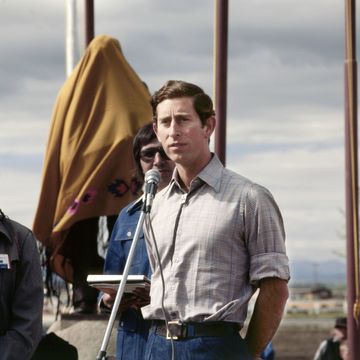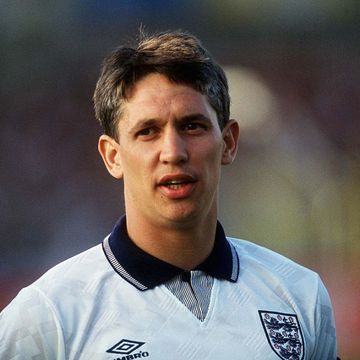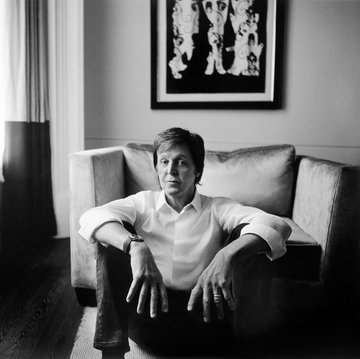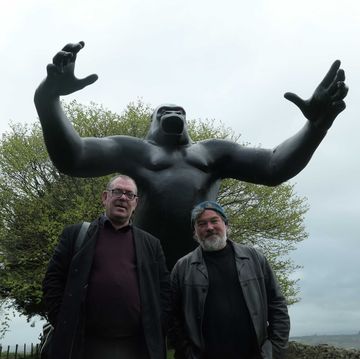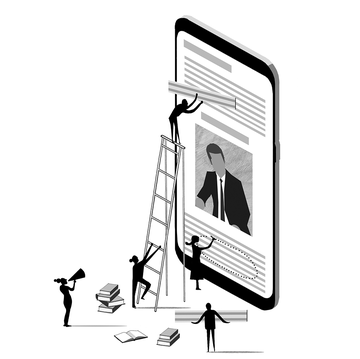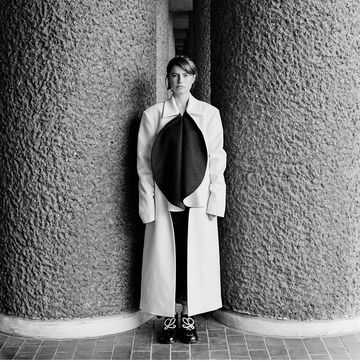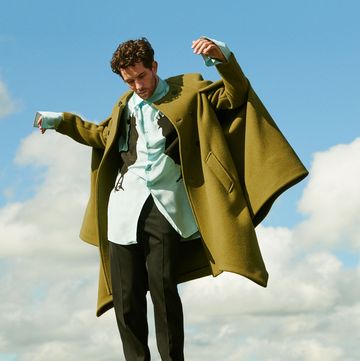At a little after 6.30, nearly every weekday morning, George Osborne — 46 years old, tall, rich, boyish, tieless — takes the bus from Notting Hill in west London, where he lives, to Kensington High Street, where he works, orders his breakfast to take away from Leon, arrives at the marbled and airy headquarters of the London Evening Standard, takes the lift to the second floor, enters his corner office, and sets about destroying his political enemies.
Osborne assumed the editorship of the Standard in May of this year. The newspaper is one of Britain's oldest surviving titles. It was first published in 1827, and since 2009, when it became free, it has been handed to nearly one million commuters in London every weekday. Editing the Standard is a serious job for a serious journalist. Osborne's formal qualifications for the position are slight. Before he took the Standard job, he had almost no experience working in journalism, apart from editing two issues of the University of Oxford's student magazine, the unfortunately named Isis, while he was an undergraduate and briefly freelancing for newspapers in his twenties. When his appointment was announced in March, the reaction from other parts of the media ranged between bafflement and outrage. "My threshold for being shocked just rose a little more," tweeted Andrew Neil, the BBC political anchor and former editor of The Sunday Times. Other commentators were less polite.
Until recently, Osborne prided himself on his career-long dedication to politics: first as a researcher in the Conservative Party, and then as a special advisor, a member of parliament, and, at 33, the shadow chancellor. In 2010, at 38, he became chancellor, a position that put him in control of the government's spending and made him the second-most powerful person in David Cameron's government. His political ascent came to a hard stop only after Britain voted to leave the European Union in June of last year, and Osborne, who had campaigned for Britain to remain in the union, was cast aside by the new prime minister, Theresa May.
To add to the controversy surrounding his appointment at the Standard, Osborne was still a Member of Parliament when his editorship was announced, as well as an advisor to BlackRock, the investment giant. After a considerable outcry, Osborne resigned his parliamentary seat in April, but he has so far seemed unwilling to give up his post at BlackRock, where he is paid £650,000 a year for around 50 days' work.
Osborne couldn't care less about the brouhaha, because he is having the time of his life. You've never seen someone have so much fun. In the editor's chair, he's been like a nine-year-old boy on a sunny day, armed with a Super Soaker water toy. Because of his glaring conflicts of interest, and because he understands the inner lives of politicians more intimately than any reporter — because, in fact, he still is a politician — the Standard has lately become what it had not been for years: a must-read.
Day after day, Osborne hammers out front-page headlines and unbylined editorial leaders haranguing his former colleagues in the Conservative Party, who are now leading the country out of the European Union with a thin mandate and in chaotic style. To a lesser degree, and more predictably, he has also lambasted Jeremy Corbyn's Labour Party, who oppose the Conservatives with corresponding ineptitude but growing popularity. Volleys are fired and axes ground. Nobody's reputation is spared, except perhaps Osborne's own. The moment at lunchtime when @George_Osborne tweets his paper's front page, its leader column, and a frequently savage political cartoon is now a galvanic juncture in the day's news cycle.
Osborne seems to reserve his choicest weapons for Theresa May, the beleaguered prime minister. On his first day as editor, the front page of the Standard announced "Brussels twists knife on Brexit [as] EU chief mocks PM May with her own 'Strong and Stable' leadership slogan". The attacks on May have become only more intense since then. (One clinical sentence in a Standard editorial from 21 June simply read: "Enough of this nonsense.") Osborne's animus against May is complicated in origin — personal, political, ideological, tactical — but purely felt. When I met him at the Standard this past spring, he was polite enough about the prime minister. But according to one staffer at the newspaper, Osborne has told more than one person that he will not rest until she "is chopped up in bags in my freezer".
The story of Osborne's editorship is a particularly British parable about power and an insight into the often-dispiriting carnival of public life in London in 2017. To tell it, I have had to rely on other influential people, who would often speak only on background. But to know how and why Osborne came to be at the Standard in the first place, firing his water pistol every which way, you need to understand the curious — and, his friends say, unfair — image he accrued over 11 years in frontline politics.
Gideon Oliver Osborne was born in 1971, to rich and well-connected parents. (He changed his first name from Gideon, which he hated, when he was 13.) His father, Sir Peter Osborne, who started the successful wallpaper firm Osborne & Little, is the 17th baronet of Ballentaylor and Ballylemon, a title that goes back to the 1600s. George will inherit the baronetcy when his father dies. Osborne spent his childhood at the very best private schools, finishing at St Paul's, a hothouse for the clever sons of wealthy Londoners. He was, by the accounts of contemporaries, an intelligent, unathletic boy, beguiled by history and computers, and unbeatable in the debating hall.
At Oxford, Osborne studied modern history, which he continues to relish. Much to his subsequent embarrassment, he also began to run with a braying crowd, and joined the Bullingdon Club, an elite dining club for rich young men. (Being a former pupil of St Paul's rather than Harrow or Eton, Osborne was almost not posh enough for the Bullingdon; when he was admitted, he was known as "Oik".) On "Buller" nights, members of the club, to which David Cameron and Boris Johnson also belonged, put on tails and bow ties, got high on privilege, alcohol, and, for some, more besides, and behaved boorishly to the point of criminality. A Bullingdon member of Osborne's vintage told The Observer Magazine, "It was horrible, horrible. We used to smash everything up then pay a cheque saying: 'It's OK, we can pay for it.'"
The tail-coats caricature of Osborne has persisted. The Daily Mail once described his manner as that of "an aristocrat in a powdered wig, peering nervously through his carriage window at the Parisian mob on the eve of the French Revolution". Indeed, as a younger man, Osborne himself sometimes played up his Regency-dandy persona. In his biography of the then-chancellor, Janan Ganesh relates a conversation in which Jeffrey Archer, the scandal-tainted Tory grandee and best-selling novelist, suggested that Osborne did not have the skills to make money in the real world. "You are obviously unaware of my personal circumstances," Osborne replied.
The image of Osborne as a blithe and snooty aristo may be indelible, but it is belied by his political development. In the era of Tony Blair's reimagined and, for a time, politically unstoppable Labour Party, Osborne was one of the first Tories to grasp the idea that the Conservatives also needed to modernise to survive. (Osborne venerates Blair and views his autobiography, A Journey, as essential reading.) He saw no reason why Conservatism could not speak to young and idealistic people. Although the prevailing view of Osborne as chancellor was that he was a primarily tactical rather than ideological politician, his friend and advisor Daniel Finkelstein says, "He has some very strong core beliefs: he is a free-market liberal, but even more than that, he is a social liberal, and an internationalist."
Osborne also knew how to play the game. You need more than a little political savoir faire to make the journey from special advisor to chancellor in a decade. He always had the ability, even as a young man with little experience, to understand the weaknesses in an opponent's arguments. Because of this peculiar form of empathy, he became invaluable to Conservative leaders as they prepared for Prime Minister's Questions. In the early 2000s, when Osborne worked for William Hague, the leader of the Conservatives at the time, he helped Hague rehearse for PMQs by acting the role of Tony Blair. It was an alarmingly accurate portrayal. Osborne could mimic not just the hand movements and the accent but even the precise arguments Blair would make.
"One of the few times that Hague ever had a Prime Minister's Questions disaster, it was because George wasn't there and we completely failed to see where Blair would go on a question," recalls Finkelstein, who worked with Osborne on Hague's team. "George thought it was hilarious that we got it completely wrong without him."
In 2010, when Osborne became chancellor in the Tory-Liberal Democrat coalition government, he faced the aftermath of a global financial crisis and a national economy with swelling debt problems. He once remarked, in a poker reference, that he started his career as chancellor having been dealt a "two and a three". In the description of one of his aides, he saw politics as "the biggest toy in the playground", a playfulness that manifested itself during exchanges in parliament, when a puckish smile would often dance across Osborne's face. This naked enjoyment of the sport of politics also fed into one of the most enduring criticisms of Osborne and his fellow metropolitan Tories: that for them, politics was less vocation than recreation. (Or, to put it another way, they were less interested in the effect of their decisions than in the fact of wielding power.) That impression was excessively damaging for a politician like Osborne, who oversaw the austerity programme the Conservatives deployed in response to the deficit. It is one thing to be a rich chancellor who administers severe cuts to public services and local government. It is another to appear to relish the opportunity.
Osborne was self-aware enough to know that his public persona was unpopular. In 2010, Matthew Norman, a columnist for The Independent, wrote of his bafflement that Osborne never tried to remove the scent of "born-to-punish superiority" that clung to him. But Andrew Cooper, a pollster who worked in the Cameron government and was an early promoter of its modernisation efforts, says that Osborne's masochism was deliberate. Cameron, who came from an equally privileged background, drew nowhere near the opprobrium his chancellor did — in part, says Cooper, because the public saw Cameron as a "family man". Cooper frequently asked Osborne to do more to soften his image — for instance, by inviting the media to meet him at home, with his kids — but the chancellor demurred.
Cooper told me that when Osborne became shadow chancellor, he felt he didn't have credibility with the City of London, a crucial quality for whoever holds the position. "He felt he had to battle really hard to get that. He felt that was something you didn't tamper with, you didn't dilute it," Cooper said. "I think he concluded he had to take on the chin that he had this very harsh public image because it was the downside of the positive of being taken seriously by people on whom a chancellor's credibility depends."
In 2012, Osborne was confronted with his public image in the most brutal fashion. At the Summer Paralympics in London, he was announced to the stadium to give out the winners' medals and was booed by the crowd. Cooper and others who worked with Osborne said that the chancellor was hurt by the humiliation.
Another of his closest aides told me that while it "didn't keep him up at night", the incident caused Osborne to reflect. "He doesn't want people to think he's an asshole, because he's not an asshole," said the former aide.
It says something about Osborne's confidence that he believed his poor personal ratings might not preclude him from eventually becoming prime minister. When the Conservatives won a majority in the 2015 general election, somewhat to the surprise of pollsters, Osborne began, in the words of one friend, to get "organised" for a run at the leadership, by amassing supporters in parliament. David Cameron had promised to resign sometime before the next scheduled general election, in 2020. The Conservatives, and the country, would need a new leader. On the horizon, however, a vast storm was brewing that would scupper many ships, including Osborne's: Brexit.
On 24 June 2016, a little more than a year after the Conservatives won the general election, and a little less than a year before he started his job at the Standard, Osborne came down the stairs of 10 Downing Street in the early morning and — according to the riveting account in Tim Shipman's All Out War — gave a straightforward assessment of the political situation as he saw it. A few hours earlier, the country had voted, by a margin of 52 per cent to 48 per cent, to leave the European Union, the biggest political decision in Britain since the end of World War II. "Well," Osborne said, "Dave's fucked, I'm fucked, the country's fucked."
He was right about the first part and probably the last. "Dave" resigned some minutes later with his sombre wife, Samantha, by his side. Osborne preferred to stay in his post for the moment, as the stock and currency markets reacted violently to Britain's decision to leave the EU. But he knew without doubt that his career as chancellor would shortly be over, and that his political prospects were severely diminished. His fortunes were too closely aligned with those of both Cameron and the Remain project; the victory by the Leave lobby could do nothing else but crush him. What must have been especially galling for Osborne was that he had never wanted the referendum in the first place — in part because he feared the Leave campaign might win it and in part because he thought it would rip apart the Conservative Party it was designed to heal. He had argued vociferously with Cameron on these points, only to be overruled.
The Brexit result and its aftermath proved Osborne correct but if he felt rancour about Cameron's decision, he did not show it. Instead, he studied the landscape in front of him. The prime minister, Osborne's greatest political ally, was gone. In the coming days, someone would win a hastily arranged Conservative leadership election, and a new prime minister would be in place. The front runner was Boris Johnson, the straw-haired faux-buffoon whose defection to the Leave campaign was instrumental in its success. Johnson's celebrity was greater than any of the other potential candidates', but he also divided the Conservative Party between those who thought him a "rock star" and those who considered him utterly unsuited to the highest office. (Osborne, his friends say, briefly considered a run at the leadership himself before discounting it for the same reasons he had deemed himself "fucked" a few days earlier: he was too close to Remain, and too close to Cameron, to succeed.)
After a frenzy of intrigue, in which Johnson withdrew from the race, having been stabbed in the back by his former ally, Michael Gove, only one credible candidate remained: Theresa May. She duly became prime minister and, in one of her first acts, summoned Osborne to 10 Downing Street to fire him. May rubbed salt in the wound by telling Osborne that he should "get to know the party better" if he had ambitions to one day lead the Conservatives, a condescending piece of advice that Osborne did not heed.
In the months that followed Osborne's departure from the cabinet, he received offers from speaking agents, universities, publishers and financial institutions. He took a couple of those gigs, including the extraordinarily lucrative consultancy with BlackRock. His speeches, meanwhile, earned him tens of thousands of pounds at a time. Making money was fun, and kept him in silk handkerchiefs. But even though he remained an MP, it was clear to his friends he longed to be closer to the political action. Almost precisely at that moment, an opportunity arose.
The details of how Osborne was appointed at the Standard are unsettled and differ depending on whom you talk to. In late January, Sarah Sands, the previous editor of the paper, announced she was taking a new post as editor of BBC Radio 4's Today programme. That news led some established print journalists to throw their hats into the ring: Andrew Pierce of the Daily Mail, Sarah Baxter of The Sunday Times, Matthew d'Ancona of The Guardian, and a handful of others. That none of these candidates ultimately stood a chance against a man who had edited just two issues of a student magazine is a testament to the idiosyncratic tastes of Evgeny Lebedev, the Standard's 37-year-old Russian-born owner.
He is the son of Alexander Lebedev, a rich Russian and former KGB agent who made his money in banking and other investments in the post-Soviet era. Lebedev père is an intense and somewhat inscrutable product of his training and his generation. Despite a lightly hipsterish wardrobe (skinny jeans, trainers), he gives the strong impression of a man not to be trifled with. On a Russian television show in 2011, Sergei Polonsky, a fellow millionaire, made an offhand remark that he would like to give Lebedev a "punch in the chops". Lebedev hit Polonsky in the face so hard that Polonsky fell off his chair. After the incident, Lebedev was unrepentant. He said his fellow panellist had presented a "threat" that he had "neatly neutralised".
Lebedev fils is an altogether different species of cat. Never less than impeccably attired, with doll-like cheeks above a tight, thick, black beard, he has spent most of his life in the UK. He now lives between his lavishly furnished mansion in Hampton Court and houses in Italy. He likes the theatre. He takes a lot of private jets. He is moved by the plight of the African elephant. He enjoys the company of celebrities, particularly actors. He throws wildly generous parties that, according to one friend, would put Gatsby to shame. He is often late.
In 2009, the Lebedevs bought a 75 per cent share in the loss-making London Evening Standard from the Daily Mail and General Trust for the sum of one pound. (As a spy, Alexander Lebedev had lived on Earls Terrace, in Kensington, a short walk from the Standard's offices.) The Lebedevs promptly made the title free, a decision that proved to be a masterstroke. As a paid-for newspaper, the Standard's circulation had declined precipitously and advertising had plummeted. But a free newspaper with the Standard's heritage, handed to nearly a million commuters every evening, proved a more attractive proposition for advertisers. Within three years, the paper was profitable again.
The Lebedevs had less luck with their other forays into British media. In 2009, they also began discussions with the owners of The Independent, another perennially loss-making newspaper, about a possible sale. (I worked at The Independent more than a decade ago.) That deal, in which the Lebedevs bought both The Independent and The Independent on Sunday, also for one pound, was signed in 2010. Both titles continued to haemorrhage money, and last year Evgeny Lebedev announced that The Independent henceforth would exist as a digital-only outlet. Many journalists lost their jobs. (This summer, it was reported that a Saudi investor, Sultan Muhammad Abuljadayel, had taken a stake — somewhere between 25 and 50 per cent — in the Independent, meaning Lebedev was no longer a majority shareholder.)
In 2009, there had been some understandable bunching-up of skirts about a former KGB man assuming control of three of Britain's newspapers, but those concerns were quickly overridden by the simple and refreshing fact that someone, anyone, wanted to invest serious quantities of money in journalism. In any event, Alexander Lebedev's influence over the papers appears to have been slight. The titles are under Evgeny's control.
The younger Lebedev has never indicated he wishes to steer his newspapers into new political waters. Indeed, having spoken to many people who know him (although I did not, despite several months of reassurances and rescheduling, interview Evgeny himself), it was difficult to discern a clear answer about what motivates him. Simon Kelner, who once worked for Lebedev as editor of The Independent, gave the fullest response to that question: "I don't think he actually wants power; I think he wants influence," Kelner said. "And it's a very particular type of influence: it's the ability to invite people to a party and they will come. That is basically the influence that he wants. He doesn't want to change the government; he doesn't want to either uphold or wreck the system. As far as I can see, he's got no perceptible ideology. He wants to be thought of as a respected member of London café society. But he wants to be thought of as a person of substance as well. Now, whether he does the things that make people think he is a person of substance is another matter, but he would certainly want to be regarded as, you know, someone pretty important."
If these are Lebedev's aims, then he has been successful, up to a point. It's always surprising how often he crops up not just in the society pages but as a footnote to more interesting engagements. In February 2016, for instance, Boris Johnson and his wife, Marina Wheeler, hosted a dinner at which Johnson and Michael Gove deliberated about whether to join the Leave campaign: an occasion of real importance, it would turn out. According to Sarah Vine, a Daily Mail columnist, who is married to Gove, an iPhone was propped up in the middle of the table and put on speakerphone so that Johnson and Gove could speak to another Conservative cabinet member and a lawyer about the EU. The only other person at the dinner not married either to Gove or to Johnson was Evgeny Lebedev, who arrived, in Vine's description, "impeccably groomed and suited". In the end, it was a puzzling sort of evening: the two politicians talked to the iPhone while Vine, Wheeler and Lebedev sat at the other end of the table, ate slow-roasted lamb, and talked in whispers so as not to disturb "the boys".
All newspaper proprietors reserve the right to be capricious. That's part of the fun. They are, in their strange kingdoms, absolute monarchs. But the decisions that Evgeny Lebedev makes as a media owner, say those who have worked with him, are particularly influenced by a small coterie of friends and advisors. There is, in short, a Lebedev court. For example, he had an assistant and advisor for some years, an able and loquacious young journalist named Amol Rajan, upon whose counsel he came increasingly to rely and who still has his ear. In 2013, seemingly out of nowhere, Rajan was made editor of The Independent, at the age of 29. Lebedev, it can be assumed, is not a pure meritocrat: his friends do better in his enterprises than people who are not his friends. (This approach contrasts markedly with Osborne's in government; the chancellor cast a wide net to find the most talented advisors.)
It was little surprise, then, that when Sarah Sands announced she was leaving the Standard, prospective candidates tried to curry favour with Lebedev. According to some well-placed sources I spoke to, Matthew d'Ancona, The Guardian columnist, asked Osborne to put in a good word for him with Lebedev. (D'Ancona declined to speak to me for this story.) Osborne's and Lebedev's paths had crossed a few times, as those of senior politicians and newspaper proprietors tend to, but they were not especially close. It occurred to Osborne that the job for which d'Ancona was applying sounded rather interesting. He talked to a few friends about the "mad idea" he had. They were enthusiastic. Osborne called Lebedev and suggested that he'd like the Standard position. Lebedev, says someone who witnessed the recruitment procedure, was thrilled at the prospect of Osborne in the editor's chair. Everyone else who applied had solid credentials but, said the Lebedev confidant, "they were just journalists". Osborne offered something different, not least a quality Lebedev prizes highly: celebrity.
Within a couple of weeks, Osborne and Lebedev had agreed to terms. Shortly afterwards, Rajan, by now the media editor at the BBC, announced in a series of 11 breathless tweets an exclusive whose provenance was not hard to fathom. One of Rajan's tweets read: "Undoubtedly huge coup for ES, which gets v high profile + calibre leader — and also for ES owner (my former boss) @mrevgenylebedev". Rajan also suggested that the appointment would not damage Osborne's "still vast" political ambitions, and that the staff at the newspaper would be "galvanised". Rajan did not mention that he and Lebedev had discussed Rajan taking the Standard job, well before Osborne ever had his "mad idea".
In late May, I visited Osborne at the Standard. It was a little after 12.30 in the afternoon, a frenetic moment for an evening newspaper whose second edition, the West End Final, goes "off stone", as they say in the argot, at one o'clock. Osborne seemed relaxed. He was still new in the job but had settled into the rhythm easily enough. (To smooth his transition, he had brought his assistant from parliament, Zoe Lord, to work for him at the Standard; after our interview, she brought him a boxed lunch and a bunch of grapes as he walked into his next meeting.) From the sofa in his office, he pointed out the framed front pages from his first three weeks, which hung on his wall, most of which seemed outright attacks on Theresa May's cavalier approach to Brexit. He also showed me that evening's front page, which he had just tweeted out. It concerned an argument over intelligence leaks between British and American services in the wake of the Manchester bombing. The headline read: "What special relationship?"
Osborne insisted he was not using his new role to settle any vendettas. If he attacked someone, he said, it was because he and the paper disagreed with their position, nothing more. Everyone knew he was against Brexit and thought the government's approach to its discussions about leaving the union had been mishandled. But it was revealing how much he fused his own politics with those of the Standard. "The paper's view," he told me, "is it's metropolitan, it's small-l liberal, it's internationalist, it's pro-business, and I don't think that voice is heard enough in British politics at the moment."
When I suggested that he seemed to save his most vicious attacks for his former colleagues in the Conservative Party, he said, as politely as he could, that I was missing the point. "Most newspapers are very partisan. I'm sticking it to the Corbynista left and the hard-Brexit right. I feel that millions of people are in that space, and feel unrepresented."
As a mission statement, this seemed laudable. There is a huge space left unfilled in British politics, so yawning a chasm that there is serious talk of a new political movement, similar to France's En Marche, to occupy the centre ground. But Osborne's plea that he is an equal-opportunity assassin would be more credible if he did not have quite so much skin in the game. Intelligent readers can't help but interpret his front pages and editorial decisions in the light of his known lack of respect for the prime minister and his disapproval of a headlong rush into Brexit.
Osborne told me that he didn't care how people interpreted his newspaper or what people thought of him. "One of the things I always felt as chancellor is you've got to make decisions and you've got to be prepared to make calls," he said. "And it's so easy in life and in politics and in journalism to always pull your punches and always put off the difficult decision. I was perfectly used as chancellor to being controversial and to people having strong views about me, positive and negative, but I thought at the time: I'm in this job, and I'm paid to make decisions, and I'm going to make the best judgement calls I can. I take the same approach to journalism. I'm paid to produce a paper that has attitude and gives voice to people whose voices are not being heard, and I don't really give a damn if some are offended by that."
One can imagine a few left-leaning politicians for whom Osborne's voice-to-the-voiceless speech might stick in the craw. Nevertheless, it's clear Osborne believes it; equally clearly, there is self-interest at play in his decisions. You can read the Standard through the prism of someone trying to provoke the current government, but also of someone attempting to protect and burnish his own legacy. The tightrope upon which he walks was illustrated when the Grenfell Tower caught fire in June, killing at least 80 people in west London. It was a profound tragedy that became intensely political. Grenfell was inhabited mostly by the poor, by students, and immigrants, but it sat in the heart of one of the richest neighbourhoods in the capital. In the aftermath, many papers, including establishment stalwart The Times, ran powerful investigative series on the missteps and cost-cutting that led to the fire.
Osborne's Standard covered the disaster in a different way: calling on people to show "unity in grief" and raising funds for victims. Osborne was shaken by the tragedy. He could see the fire burning from his house, and later in the day, he declared himself "still numb with what I saw this morning". But he seemed anxious about politicising Grenfell. One Standard staffer told me that Osborne, who was on a flight in the hours following the fire, sent a note to the op-ed department telling them not to go "OTT" in their Grenfell analyses.
There was speculation that Osborne's editorial line on Grenfell was born of a concern that the budget cuts he oversaw as chancellor might be linked to the deaths of mostly poor Londoners. (This was, in fact, precisely Labour's line of attack.) But Osborne insists that wasn't the case.
"I was sceptical of the instant experts in other papers who rushed to blame the whole thing on Kensington and Chelsea Council saving costs," he told me, noting that the cladding accused of accelerating the fire was in use across the UK long before austerity measures took effect. "It's the kind of sloppy journalism I'm trying to get my paper, at least, away from. The failure was a massive failure of fire standards over many, many years, and that is a scandal we've talked about."
Peter Oborne, a conservative columnist and a long-time critic of Osborne's, told me that such moments illustrate how Osborne's conflicts of interest diminished him as an editor. "What we need, what we haven't seen, but what we would expect to see from a London paper of the standing of the London Evening Standard would be a really forensic investigation about the government failings which have led to the fire," Oborne told me in the days that followed the tragedy. "As far as I can tell, nothing of the sort has occurred."
If Grenfell showed the dangers for Osborne in his foray into journalism, election night in June showed him at his most potent. Theresa May had called a snap election to strengthen her own position, with her party apparently more than 20 points ahead in the opinion polls. But a series of tactical and strategic errors on her part, as well as a growing realisation that she was an uninspiring figure to lead the country at a crucial time, led to a disastrous result: she failed to win an outright majority.
Osborne, who had been booked to comment on election night by ITV, could not wipe the smile from his face when it became clear that May's Conservatives had been broadsided. (One wag on Twitter showed a screen grab of Osborne's beaming face at this moment, with the caption: "Get yourself a girl who looks at you the way George Osborne looks at exit polls.") A few days later, during a Sunday-morning appearance on the BBC, Osborne clarified his thoughts on the prime minister's prospects. "Theresa May," he said, "is a dead woman walking."
A former Downing Street aide was delighted by the ex-chancellor's willingness to be forthright. The aide told me that in the aftermath of the referendum, after firing Osborne, Theresa May's team had gone out of its way to trash his legacy in briefings to the press. At that time, said the aide, "George didn't have a platform to show his resilience." But, he continued, "he's got a gun now. One thing people in the Conservative Party will realise is: 'you mess with George Osborne at your peril.'"
This speaks to the central question about Osborne's move to the Standard: whether it will be a bridge back to front-line politics for him, or whether, in fact, he has poured paraffin on the bridge and tossed a lit match in its direction. Few who have witnessed the topsy-turvy past two years in British politics would want to make firm predictions about the next two. Who knows what will happen as Britain lurches towards the Brexit deadline in 2019? No current member of the government will emerge with much credit. For Osborne, this may not be the worst time to sit on the sidelines. Sam Coates, a political journalist for The Times, said that Osborne might be content as long as he has influence.
"I cannot stare into his soul," Coates said, "but I think Osborne likes power. And power is executed in a number of forms."
Could Osborne still be prime minister one day? It seems hard to imagine. Shortly before I wrote this piece, I received a call from a very senior figure in the right-wing media. This person told me that Osborne had fatally damaged his own prospects of ever returning to government through his public disloyalty to the party.
"He's made too many enemies," said the source. "A lot of Tories will find it very difficult for him to be seen as one of the tribe any more."
On the question of whether Osborne has made a good editor of the Standard, the same senior media figure was slightly more generous. "It's an interesting appointment. Depending on your point of view, he's either hijacked the Standard to lead a great revenge attack, or he's reinvigorated the Standard with a political pulse."
What, I asked, was his own view of Osborne as editor?
"As the Chinese premier said about the French Revolution: it's too early to tell."



